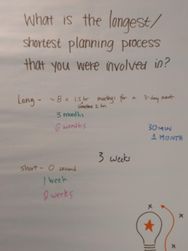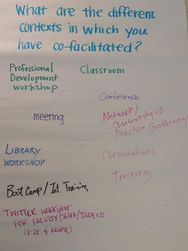Documentation:CTLT Institute/Facilitator Community/2019 Summer
Session Description
This workshop is designed with our valued Institute Facilitators in mind; however, we invite your participation should you like to deepen your co-facilitation skills in your own context!
Co-facilitation is a dynamic working relationship between facilitators that support the group’s learning process. Join us to explore the opportunities and challenges of co-facilitation, discuss the structures and processes that enable effective co-facilitation, and reflect on your experiences and/or approaches to co-facilitation. You will leave this workshop with practical considerations for when you dance with your co-facilitator in supporting your participants’ learning as well as a mini-toolkit of co-facilitation best practices.
Logistics
Date: July 25
Time: 1:00 - 2:30 p.m.
Location: CTLT Seminar Room (2.22)
Materials
Flipcharts - Conversation Prompts, Objectives, Instructions for Snowball Discussion
Sticky notes
Pen & Paper
Masking Tape
Whiteboard & Flipchart Markers
Lesson Plan


As participants arrive...

Place conversation prompts (questions below) around the room to encourage informal conversations between participants:
- What is the largest co-facilitation team that you were a member of?
- What is the longest/shortest planning process that you were involved in?
- What are the different contexts in which you have co-facilitated?

Welcome, Introductions & Land Acknowledgement
(Time: 5 min; 5:00)
Please share your name, department, and one thing you hope to get out of this workshop.
There are lots of expertise and experience in the room; we will work to leverage each other's unique strengths to inform our evolving co-facilitation practice and to co-create our learning.
Learning Objectives
(Time: 1 min; 6:00)
By the end of this session, you will be able to:
- Appreciate opportunities of co-facilitation
- Reflect on your own co-facilitation experience to identify your needs and defaults
- Strategize approaches to address common challenges associated with co-facilitation
- Craft questions that you will integrate into your co-facilitation process
Table Discussion - Why Co-facilitate?
(Time: 15 min; 21:00)
At your tables, please assign a scribe, a time-keeper, and a presenter. You have 8 minutes to to discuss "why co-facilitate?" Please capture your discussions on the flipchart paper provided.
Report back (1 minute per group)
Debrief & Summary
Co-facilitation offers many benefits - these are our ultimate goals of effective co-facilitation. With our eyes on the prize, this workshop will explore how to bring these benefits consistently into our co-facilitation practice.
(One interesting observation that one co-facilitator made was the organic facilitative conversation that emerged during this activity. Participants were invited to consider what factors may have contributed to this - role assignment? expectation management? etc.)
Snowball Discussion
(Time: 30 min; 51:00)
On your own (1 min): What are your personal apprehensions or challenges around co-facilitation?
Pair (3 min): What might the impact be on your co-facilitator?
Pair-of-pairs (5 min): What might be the impact be on your participants?
Large Group Debrief (20 min): What could possibly go wrong?
| You | Your Co-facilitator(s) | Participants | |
|---|---|---|---|
| Before |
|
| |
| During |
|
| |
| After |
|
| |
| Ongoing |
|
||
"Best Practices" and Key Considerations
(Time: 15 min; 66:00)
Brainstorm (5 min): With considerations to the complexities and potential challenges associated with co-facilitation (table above), what might you do proactively to address them? Jot down your idea, approach or strategy on the sticky notes provided. (One idea per sticky note)
Report Back & Gallery Walk (5 min): Place your sticky notes onto the matrix and see what others have come up with
| Co-facilitators | Participants | |
|---|---|---|
| Before |
|
|
| During |
|
|
| After |
|
|
Debrief/Summarize (5 min)

Putting It to Practice
(Time: 23 min; 89:00)
Crafting questions (8 min): Reflecting on your needs, defaults, and approaches to facilitation, craft some questions or key considerations for yourself and your co-facilitator. (to clarify expectations, set boundaries, etc)
Some questions may include:
- What are your other commitments that may take up your time and attention?
- What are your goals for co-facilitating this workshop/session?
- Who's printing out handouts, emailing follow-up surveys/evaluation form?
Parting Question (15 min): When not to have a co-facilitator?
Wrap Up
(Time: 1 min; 90:00)
One-minute paper: what is one thing that you are taking away from this session?
Sharing Permission
This lesson plan was developed by Drs. Deb Chen and Judy Chan of the Centre for Teaching, Learning and Technology.
|
|